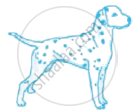Advertisements
Chapters
![NCERT Exemplar solutions for Mathematics [English] Class 7 chapter 2 - Fractions and Decimals NCERT Exemplar solutions for Mathematics [English] Class 7 chapter 2 - Fractions and Decimals - Shaalaa.com](/images/mathematics-english-class-7_6:5f2b1b2038084cf381bfa42c826a928c.jpg)
Advertisements
Solutions for Chapter 2: Fractions and Decimals
Below listed, you can find solutions for Chapter 2 of CBSE NCERT Exemplar for Mathematics [English] Class 7.
NCERT Exemplar solutions for Mathematics [English] Class 7 2 Fractions and Decimals Exercise [Pages 38 - 54]
Out of four options, only one is correct. Write the correct answer.
`2/5 xx 5 1/5` is equal to ______.
`26/25`
`52/25`
`2/5`
6
`3 3/4 ÷ 3/4` is equal to ______.
3
4
5
`45/16`
A ribbon of length `5 1/4` m is cut into small pieces each of length `3/4` m. Number of pieces will be ______.
5
6
7
8
The ascending arrangement of `2/3, 6/7, 13/21` is ______.
`6/7, 2/3, 13/21`
`13/21, 2/3, 6/7`
`6/7, 13/21, 2/7`
`2/3, 6/7, 13/21`
Reciprocal of the fraction `2/3` is ______.
2
3
`2/3`
`3/2`
The product of `11/13` and 4 is ______.
`3 5/13`
`5 3/13`
`13 3/5`
`13 5/3`
The product of 3 and `4 2/5` is ______.
`17 2/5`
`24/5`
`13 1/5`
`5 1/13`
Pictorial representation of `3 xx 2/3` is ______.
`1/5 ÷ 4/5` equal to ______.
`4/5`
`1/5`
`5/4`
`1/4`
The product of 0.03 × 0.9 is ______.
2.7
0.27
0.027
0.0027
`5/7 ÷ 6` is equal to ______.
`30/7`
`5/42`
`30/42`
`6/7`
`5 1/2 ÷ 9/2` is equal to ______.
`31/6`
`1/27`
`5 1/27`
`31/27`
Which of the following represents `1/3` of `1/6`?
`1/3 + 1/6`
`1/3 - 1/6`
`1/3 xx 1/6`
`1/3 ÷ 1/6`
`3/7` of `2/5` is equal to ______.
`5/12`
`5/35`
`1/35`
`6/35`
One packet of biscuits requires `2 1/2` cups of flour and `1 2/3` cups of sugar. Estimated total quantity of both ingredients used in 10 such packets of biscuits will be ______.
less than 30 cups
between 30 cups and 40 cups
between 40 cups and 50 cups
above 50 cups
The product of 7 and `6 3/4` is ______.
`42 1/4`
`47 1/4`
`42 3/4`
`47 3/4`
On dividing 7 by `2/5`, the result is ______.
`14/2`
`35/4`
`14/5`
`35/2`
`2 2/3 ÷ 5` is equal to ______.
`8/15`
`40/3`
`40/5`
`8/3`
`4/5` of 5 kg apples were used on Monday. The next day `1/3` of what was left was used. Weight (in kg) of apples left now is ______.
`2/7`
`1/14`
`2/3`
`4/21`
The picture  interprets ______.
interprets ______.
`1/4 ÷ 3`
`3 xx 1/4`
`3/4 xx 3`
`3 ÷ 1/4`
Fill in the blanks to make the statements true.
Rani ate `2/7` part of a cake while her brother Ravi ate `4/5` of the remaining. Part of the cake left is ______.
The reciprocal of `3/7` is ______.
`2/3` of 27 is ______.
`4/5` of 45 is ______.
`4 xx 6 1/3` is equal to ______.
`1/2` of `4 2/7` is ______.
`1/9` of `6/5` is ______.
The lowest form of the product `2 3/7 xx 7/9` is ______.
`4/5 ÷ 4` is equal to ______.
`2/5` of 25 is ______.
`1/5 ÷ 5/6 = 1/5` ______ `6/5`
3.2 × 10 = ______.
25.4 × 1000 = ______.
93.5 × 100 = ______.
4.7 ÷ 10 = ______.
4.7 ÷ 100 = ______.
4.7 ÷ 1000 = ______.
The product of two proper fractions is ______ than each of the fractions that are multiplied.
While dividing a fraction by another fraction, we ______ the first fraction by the ______ of the other fraction.
8.4 ÷ ______ = 2.1
52.7 ÷ ______ = 0.527
0.5 ______ 0.7 = 0.35
2 ______ `5/3 = 10/3`
2.001 ÷ 0.003 = ______.
State whether the statement is True or False.
The reciprocal of a proper fraction is a proper fraction.
True
False
The reciprocal of an improper fraction is an improper fraction.
True
False
Product of two fractions = `"Product of their denominators"/"Product of their numerators"`
True
False
The product of two improper fractions is less than both the fractions.
True
False
A reciprocal of a fraction is obtained by inverting it upside down.
True
False
To multiply a decimal number by 1000, we move the decimal point in the number to the right by three places.
True
False
To divide a decimal number by 100, we move the decimal point in the number to the left by two places.
True
False
1 is the only number which is its own reciprocal.
True
False
`2/3` of 8 is same as `2/3` ÷ 8.
True
False
The reciprocal of `4/7` is `4/7`.
True
False
If 5 is added to both the numerator and the denominator of the fraction `5/9`, will the value of the fraction be changed? If so, will the value increase or decrease?
What happens to the value of a fraction if the denominator of the fraction is decreased while numerator is kept unchanged?
Which letter comes `2/5` of the way among A and J?
If `2/3` of a number is 10, then what is 1.75 times of that number?
In a class of 40 students, `1/5` of the total number of students like to eat rice only, `2/5` of the total number of students like to eat chapati only and the remaining students like to eat both. What fraction of the total number of students like to eat both?
Renu completed `2/3` part of her home work in 2 hours. How much part of her home work had she completed in `1 1/4` hours?
Reemu read `1/5`th pages of a book. If she reads further 40 pages, she would have read `7/10`th pages of the book. How many pages are left to be read?
Write the number in the box `square` such that `3/7xx square = 15/98`
Will the quotient `7 1/6 ÷ 3 2/3` be a fraction greater than 1.5 or less than 1.5? Explain.
Describe two methods to compare `13/17` and 0.82. Which do you think is easier and why?
Health:
The directions for a pain reliever recommend that an adult of 60 kg and over take 4 tablets every 4 hours as needed, and an adult who weighs between 40 and 50 kg take only `2 1/2` tablets every 4 hours as needed. Each tablet weighs `4/25` gram. If a 72 kg adult takes 4 tablets, how many grams of pain reliever is he or she receivings?
Health:
The directions for a pain reliever recommend that an adult of 60 kg and over take 4 tablets every 4 hours as needed, and an adult who weighs between 40 and 50 kg take only `2 1/2` tablets every 4 hours as needed. Each tablet weighs `4/25` gram. How many grams of pain reliever is the recommended dose for an adult weighing 46 kg?
Animal:
The label on a bottle of pet vitamins lists dosage guidelines. What dosage would you give to each of these animals?
- a 18 kg adult dog
- a 6 kg cat
- a 18 kg pregnant dog
|
Do Good Pet Vitamins
`1/2` tsp (tea spoon full) per 9kg body weight
`1/2` tsp per 4.5kg body weight
`1/4` tsp per 1kg body weight |
How many `1/16` kg boxes of chocolates can be made with `1 1/2` kg chocolates?
Anvi is making bookmarker like the one shown in figure. How many bookmarker can she make from a 15 m long ribbon?
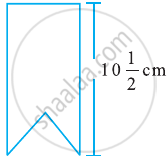
A rule for finding the approximate length of diagonal of a square is to multiply the length of a side of the square by 1.414. Find the length of the diagonal when the length of a side of the square is 8.3 cm.
A rule for finding the approximate length of diagonal of a square is to multiply the length of a side of the square by 1.414. Find the length of the diagonal when the length of a side of the square is exactly 7.875 cm.
The largest square that can be drawn in a circle has a side whose length is 0.707 times the diameter of the circle. By this rule, find the length of the side of such a square when the diameter of the circle is 14.35 cm
The largest square that can be drawn in a circle has a side whose length is 0.707 times the diameter of the circle. By this rule, find the length of the side of such a square when the diameter of the circle is 8.63 cm
To find the distance around a circular disc, multiply the diameter of the disc by 3.14. What is the distance around the disc when the diameter is 18.7 cm?
To find the distance around a circular disc, multiply the diameter of the disc by 3.14. What is the distance around the disc when the radius is 6.45 cm?
What is the cost of 27.5 m of cloth at ₹ 53.50 per metre?
In a hurdle race, Nidhi is over hurdle B and `2/6` of the way through the race, as shown in figure.

Then, answer the following:
- Where will Nidhi be, when she is `4/6` of the way through the race?
- Where will Nidhi be when she is `5/6` of the way through the race?
- Give two fractions to tell what part of the race Nidhi has finished when she is over hurdle C.
Diameter of Earth is 12756000 m. In 1996, a new planet was discovered whose diameter is `5/86` of the diameter of Earth. Find the diameter of this planet in km.
What is the product of `5/129` and its reciprocal?
Simplify: `(2 1/2 + 1/5)/(2 1/2 ÷ 1/5)`
Simplify: `(1/4 + 1/5)/(1 - 3/8 xx 3/5)`
Divide `3/10` by `(1/4 "of" 3/5)`
`1/8` of a number equals `2/5 ÷ 1/20`. What is the number?
Heena’s father paid an electric bill of ₹ 385.70 out of a 500 rupee note. How much change should he have received?
The normal body temperature is 98.6°F. When Savitri was ill her temperature rose to 103.1°F. How many degrees above normal was that?
Meteorology:
One measure of average global temperature shows how each year varies from a base measure. The table shows results for several years.
| Year | 1958 | 1964 | 1965 | 1978 | 2002 |
| Difference from base | 0.10°C | – 0.17°C | – 0.10°C | `(1/50)^circ`C | 0.54°C |
See the table and answer the following:
- Order the five years from coldest to warmest.
- In 1946, the average temperature varied by – 0.03°C from the base measure. Between which two years should 1946 fall when the years are ordered from coldest to warmest?
Science Application:
In her science class, Jyoti learned that the atomic weight of Helium is 4.0030; of Hydrogen is 1.0080; and of Oxygen is 16.0000. Find the difference between the atomic weights of Oxygen and Hydrogen
Science Application:
In her science class, Jyoti learned that the atomic weight of Helium is 4.0030; of Hydrogen is 1.0080; and of Oxygen is 16.0000. Find the difference between the atomic weights of Oxygen and Helium
Science Application:
In her science class, Jyoti learned that the atomic weight of Helium is 4.0030; of Hydrogen is 1.0080; and of Oxygen is 16.0000. Find the difference between the atomic weights of Helium and Hydrogen
Measurement made in science lab must be as accurate as possible. Ravi measured the length of an iron rod and said it was 19.34 cm long; Kamal said 19.25 cm; and Tabish said 19.27 cm. The correct length was 19.33 cm. How much of error was made by each of the boys?
When 0.02964 is divided by 0.004, what will be the quotient?
What number divided by 520 gives the same quotient as 85 divided by 0.625?
A floor is 4.5 m long and 3.6 m wide. A 6 cm square tile costs ₹ 23.25. What will be the cost to cover the floor with these tiles?
Sunita and Rehana want to make dresses for their dolls. Sunita has `3/4` m of cloth, and she gave `1/3` of it to Rehana. How much did Rehana have?
A flower garden is 22.50 m long. Sheela wants to make a border along one side using bricks that are 0.25 m long. How many bricks will be needed?
How much cloth will be used in making 6 shirts, if each required `2 1/4` m of cloth, allowing `1/8` m for waste in cutting and finishing in each shirt?
A picture hall has seats for 820 persons. At a recent film show, one usher guessed it was `3/4` full, another that it was `2/3` full. The ticket office reported 648 sales. Which usher (first or second) made the better guess?
For the celebrating children’s students of Class VII bought sweets for ₹ 740.25 and cold drink for ₹ 70. If 35 students contributed equally what amount was contributed by each student?
The time taken by Rohan in five different races to run a distance of 500 m was 3.20 minutes, 3.37 minutes, 3.29 minutes, 3.17 minutes and 3.32 minutes. Find the average time taken by him in the races.
A public sewer line is being installed along `80 1/4` m of road. The supervisor says that the labourers will be able to complete 7.5 m in one day. How long will the project take to complete?
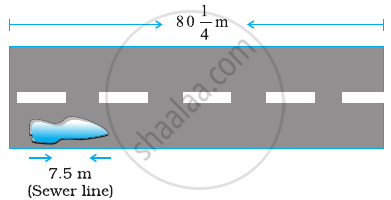
The weight of an object on moon is `1/6` its weight on Earth. If an object weighs `5 3/5` kg on Earth, how much would it weigh on the moon?
In a survey, 200 students were asked what influenced them most to buy their latest CD. The results are shown in the circle graph.
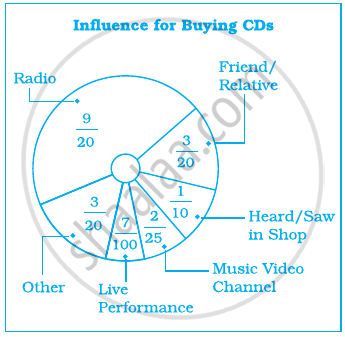
- How many students said radio influenced them most?
- How many more students were influenced by radio than by a music video channel?
- How many said a friend or relative influenced them or they heard the CD in a shop?
In the morning, a milkman filled `5 1/2` L of milk in his can. He sold to Renu, Kamla and Renuka `3/4` L each; to Shadma he sold `7/8` L; and to Jassi he gave `1 1/2` L. How much milk is left in the can?
Anuradha can do a piece of work in 6 hours. What part of the work can she do in 1 hour, in 5 hours, in 6 hours?
What portion of a ‘saree’ can Rehana paint in 1 hour if it requires 5 hours to paint the whole saree? In `4 3/5` hours? in `3 1/2` hours?
Rama has `6 1/4` kg of cotton wool for making pillows. If one pillow takes `1 1/4` kg, how many pillows can she make?
It takes `2 1/3` m of cloth to make a shirt. How many shirts can Radhika make from a piece of cloth `9 1/3` m along?
Ravi can walk `3 1/3` km in one hour. How long will it take him to walk to his office which is 10 km from his home?
Raj travels 360 km on three fifths of his petrol tank. How far would he travel at the same rate with a full tank of petrol?
Kajol has ₹ 75. This is `3/8` of the amount she earned. How much did she earn?
It takes 17 full specific type of trees to make one tonne of paper. If there are 221 such trees in a forest, then what fraction of forest will be used to make 5 tonnes of paper.
It takes 17 full specific type of trees to make one tonne of paper. If there are 221 such trees in a forest, then what fraction of forest will be used to make 10 tonnes of paper.
It takes 17 full specific type of trees to make one tonne of paper. If there are 221 such trees in a forest, then what fraction of forest will be used to make to save `7/13` part of the forest how much of paper we have to save.
Simplify and write the result in decimal form:
`(1 ÷ 2/9) + (1 ÷ 3 1/5) + (1 ÷ 2 2/3)`
Some pictures are given below. Tell which of them shows:
`2 xx 1/4`
Some pictures are given below. Tell which of them show:
`2 xx 3/7`
Some pictures are given below. Tell which of them show:
`2 xx 1/3`
Some pictures are given below. Tell which of them show:
`1/4 xx 4`
Some pictures are given below. Tell which of them show:
`3 xx 2/9`
Some pictures are given below. Tell which of them show:
`1/4 xx 3`
Evaluate: (0.3) × (0.3) – (0.2) × (0.2)
Evaluate `0.6/0.3 + 0.16/0.4`
Find the value of: `((0.2 xx 0.14) + (0.5 xx 0.91))/((0.1 xx 0.2))`
A square and an equilateral triangle have a side in common. If side of triangle is `4/3` cm long, find the perimeter of figure formed (see the figure).

Rita has bought a carpet of size 4 m × `6 2/3` m. But her room size is `3 1/3` m × `5 1/3` m. What fraction of area should be cut off to fit wall to wall carpet into the room?
Family photograph has length `14 2/5` cm and breadth `10 2/5`. It has border of uniform width `2 3/5` cm. Find the area of framed photograph.
Cost of a burger is ₹ `20 3/4` and of Macpuff is ₹ `15 1/2`. Find the cost of 4 burgers and 14 macpuffs.
A hill, `101 1/3` m in height, has `1/4` th of its height under water. What is the height of the hill visible above the water?
Sports:
Reaction time measures how quickly a runner reacts to the starter pistol. In the 100 m dash at the 2004 Olympic Games, Lauryn Williams had a reaction time of 0.214 second. Her total race time, including reaction time, was 11.03 seconds. How long did it take her to run the actual distance?
State whether the answer is greater than 1 or less than 1. Put a ‘√’ mark in appropriate box.
| Questions | Greater than 1 | Less than 1 |
| `2/3 ÷ 1/2` | ||
| `2/3 ÷ 2/1` | ||
| `6 ÷ 1/4` | ||
| `1/5 ÷ 1/2` | ||
| `4 1/3 ÷ 3 1/2` | ||
| `2/3 xx 8 1/2` |
There are four containers that are arranged in the ascending order of their heights. If the height of the smallest container given in the figure is expressed as `7/25`x = 10.5 cm. Find the height of the largest container.

In Question replace ‘?’ with appropriate fraction.
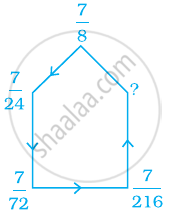
In Question replace ‘?’ with appropriate fraction.
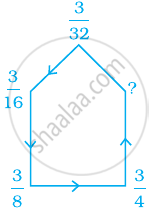
In Question replace ‘?’ with appropriate fraction.

In Question replace ‘?’ with appropriate fraction.

What is the Error in the question?
A student compared `- 1/4` and – 0.3. He changed `- 1/4` to the decimal – 0.25 and wrote, “Since 0.3 is greater than 0.25, – 0.3 is greater than – 0.25”. What was the student’s error?
What is the Error in the question?
A student multiplied two mixed fractions in the following manner: `2 4/7 xx 3 1/4 = 6 1/7`. What error the student has done?
What is the Error in the question?
In the pattern `1/3 + 1/4 + 1/5 +` ..... which fraction makes the sum greater than 1 (first time)? Explain.
Solutions for 2: Fractions and Decimals
![NCERT Exemplar solutions for Mathematics [English] Class 7 chapter 2 - Fractions and Decimals NCERT Exemplar solutions for Mathematics [English] Class 7 chapter 2 - Fractions and Decimals - Shaalaa.com](/images/mathematics-english-class-7_6:5f2b1b2038084cf381bfa42c826a928c.jpg)
NCERT Exemplar solutions for Mathematics [English] Class 7 chapter 2 - Fractions and Decimals
Shaalaa.com has the CBSE Mathematics Mathematics [English] Class 7 CBSE solutions in a manner that help students grasp basic concepts better and faster. The detailed, step-by-step solutions will help you understand the concepts better and clarify any confusion. NCERT Exemplar solutions for Mathematics Mathematics [English] Class 7 CBSE 2 (Fractions and Decimals) include all questions with answers and detailed explanations. This will clear students' doubts about questions and improve their application skills while preparing for board exams.
Further, we at Shaalaa.com provide such solutions so students can prepare for written exams. NCERT Exemplar textbook solutions can be a core help for self-study and provide excellent self-help guidance for students.
Concepts covered in Mathematics [English] Class 7 chapter 2 Fractions and Decimals are Concept of Fractions, Multiplication of a Fraction by a Whole Number, The Decimal Number System, Fraction and its Types, Concept of Proper Fractions, Improper Fraction and Mixed Fraction, Multiplication of Fraction, Concept of Equivalent Fractions, Like and Unlike Fraction, Comparing Fractions, Addition of Fraction, Subtraction of Fraction, Fraction as an Operator 'Of', Division of Fractions, Problems Based on Decimal Numbers, Multiplication of Decimal Fractions, Multiplication of Decimal Numbers by 10, 100 and 1000, Division of Decimal Numbers by 10, 100 and 1000, Division of Decimal Fractions, Division of a Decimal Number by Another Decimal Number, Problems Based on Fraction, Concept of Reciprocal or Multiplicative Inverse, Comparing Decimal Numbers, Addition of Decimal Fraction, Subtraction of Decimal Numbers.
Using NCERT Exemplar Mathematics [English] Class 7 solutions Fractions and Decimals exercise by students is an easy way to prepare for the exams, as they involve solutions arranged chapter-wise and also page-wise. The questions involved in NCERT Exemplar Solutions are essential questions that can be asked in the final exam. Maximum CBSE Mathematics [English] Class 7 students prefer NCERT Exemplar Textbook Solutions to score more in exams.
Get the free view of Chapter 2, Fractions and Decimals Mathematics [English] Class 7 additional questions for Mathematics Mathematics [English] Class 7 CBSE, and you can use Shaalaa.com to keep it handy for your exam preparation.




